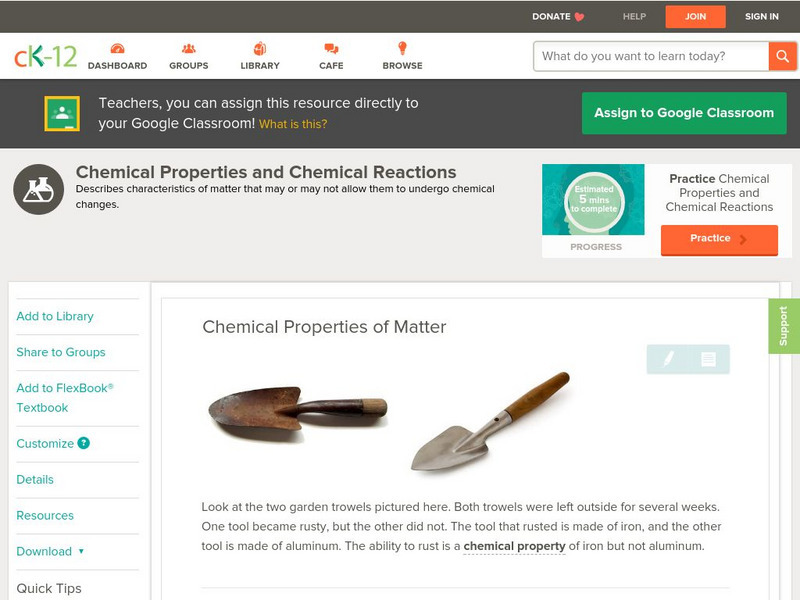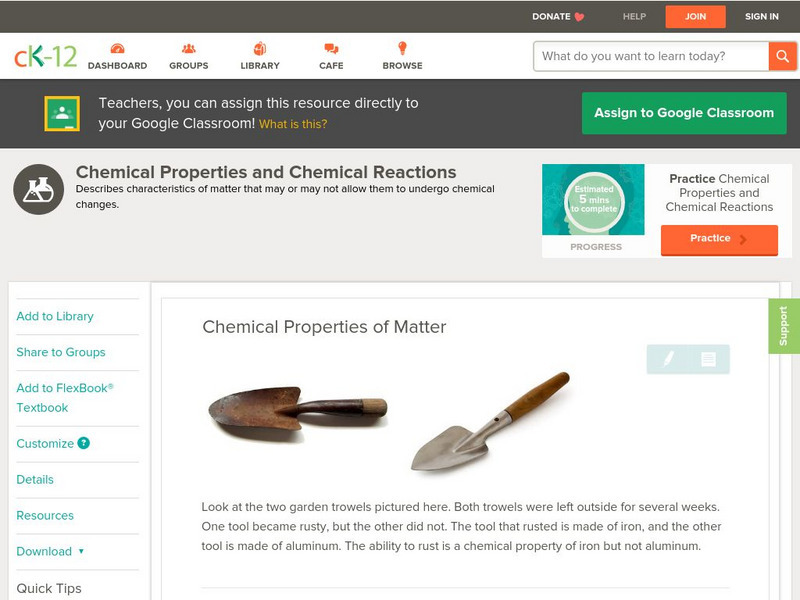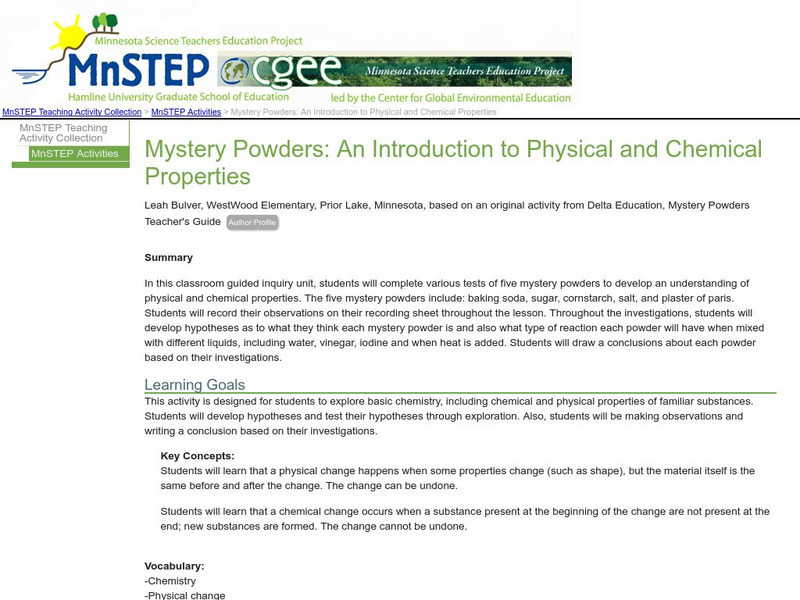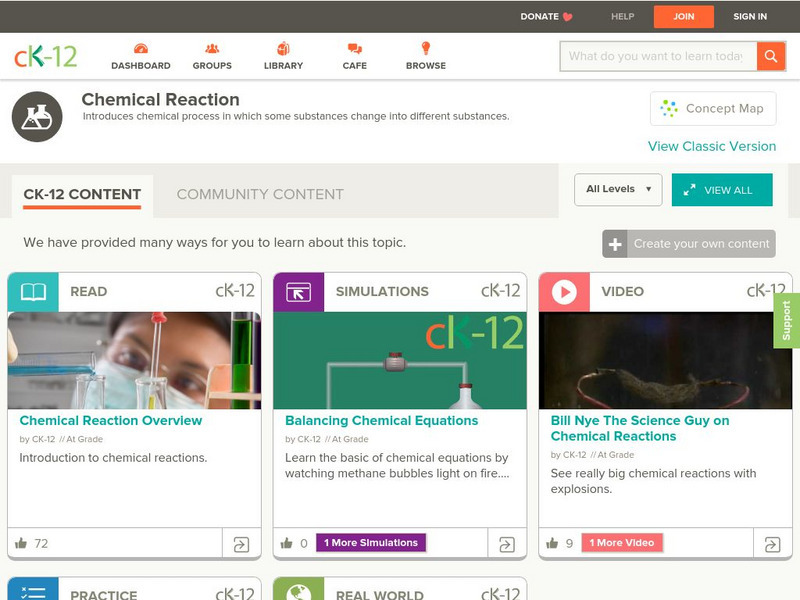Curated OER
Microscopes and Crystals
Students observe crystals under the microscope. In this science lesson, students compare how the crystal look like using their eyes, hand lens and microscope. They identify the type of crystal based on the amount of light they allow to...
Curated OER
Science: What Happens to Create the Lode?
Students understand how mineral deposits are formed and why they are not evenly dispersed. They create and describe three different precipitates from four solutions simulating mineral ore deposit formation in sedimentary rock.
Curated OER
Nanaotechnology: Small Science, BIG DEAL!
Students read an article that introduces them to the science and applications of nanotechnology. They discuss the the everyday examples of how nanotechnology is and can be used. In small groups, they observe and make inferences about...
Curated OER
The Interactive Periodic Table of the Elements
Students study the different types of metals. In this investigative activity students watch a demonstration on the effects of temperature on atoms and take a tour through baone matter.
Curated OER
Angles: Angles, Angles, Everywhere
Middle schoolers estimate and accurately measure the size of angles communicate with the appropriate geometric terms and symbols to describe and name angles, lines, line segments, rays
Curated OER
Ions in the Environment
Students explain the importance of the five main biogeochemical cycles. In this chemistry lesson, students discuss how ions are transported in the environment. They design an experiment to collect data on eutrophication.
Curated OER
Where My Peeps At?
Students conduct a series of activity that demonstrates Charles' and Boyle's Law. In this chemistry lesson, students determine the relationship among pressure, volume and temperature. They solve problems using mathematical equation.
Curated OER
Teaching The Scientific Method Using Adhesives
Students use the six step scientific method to experiment with the differences in adhesives. Students test for tack, shear, and peel in these activities.
Curated OER
Separation Before Plastic Recycling
Students participate in a demonstration to test the different densities of plastics, and suggest a method that plastic waste can be separated and collected.
Curated OER
How Hot Is It?
Sixth graders use paper cups, black and white lining, thermometers and plastic wrap to conduct an experiment that measures the energy-collecting capacity of various colors. They graph the results.
Curated OER
Landfills and the Potential for Groundwater Contamination
Students examine how a sanitary landfill is constructed, how it functions, and how waste and leachate affects the areas around the landfill. After a discussion about landfills and leachates, students construct a Sanitary Landfill Model...
Curated OER
Drums and Sound
Through discussion, demonstration, and observation of
performances by drum groups, students discover how vibrations
create sounds. Through exploration students can infer that when drums are struck they make noise due to vibrations.
Curated OER
Ice Core Research
Pupils study the work of Dr. Hajo Eicken through an audio conference. They engage in a conference call with Dr. Eicken to identify how ice core research is designed and conducted. After asking Dr. Eicken questions, they record their...
CK-12 Foundation
Ck 12: Physical Science: Chemical Properties of Matter
[Free Registration/Login may be required to access all resource tools.] Definition of chemical property and examples of the chemical properties of matter.
Other
Chem Cases: Nutra Sweet: Physical and Chemical Properties
An in-depth look at the physical and chemical properties of aspartame, or NutraSweet.
CK-12 Foundation
Ck 12: Properties of Matter
[Free Registration/Login may be required to access all resource tools.] In this learning module, students examine differences in physical and chemical properties of solids, liquids, and gases.
CK-12 Foundation
Ck 12: Physical Science: Chemical Properties of Matter
Definition of chemical property and examples of the chemical properties of matter. [Free Registration/Login may be required to access all resource tools.]
CK-12 Foundation
Ck 12: Chemistry: Chemical Properties of Matter
[Free Registration/Login may be required to access all resource tools.] Definition of chemical property and examples of the chemical properties of matter.
Science Education Resource Center at Carleton College
Serc: Physical and Chemical Properties of Water
In this lesson students will understand the difference between chemical and physical properties by studying the properties of water. Students will also understand how to perform the different laboratory techniques that go along with the...
CK-12 Foundation
Ck 12: Fifth Grade Science: Physical Science: Chemical Properties of Matter
A module that provides the definition of chemical property and examples of the chemical properties of matter using explanations, pictures, and review questions.
Science Education Resource Center at Carleton College
Serc: Mystery Powders: An Introduction to Physical and Chemical Properties
Students will complete various tests of five mystery powders to develop an understanding of physical and chemical properties. They will record their observations and develop hypotheses as to what they think each mystery powder is and...
Texas Education Agency
Texas Gateway: Properties: Extensive and Intensive
Find out about physical and chemical properties of matter, and then compare extensive and intensive property characteristics.
CK-12 Foundation
Ck 12: Physical Science: Chemical Reaction Overview
[Free Registration/Login may be required to access all resource tools.] Explains chemical property and chemical reaction.
Science Struck
Science Struck: Physical and Chemical Properties of Krypton
Read about the physical and chemical properties of the noble gas Krypton.





















